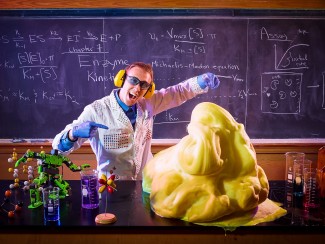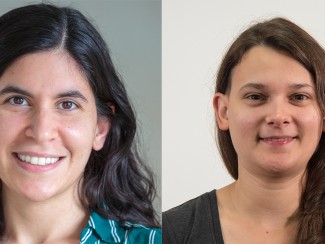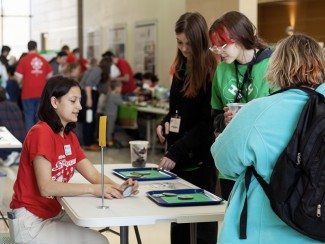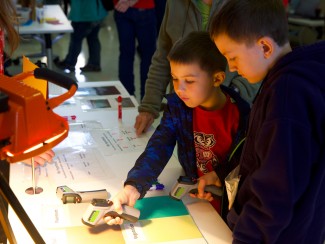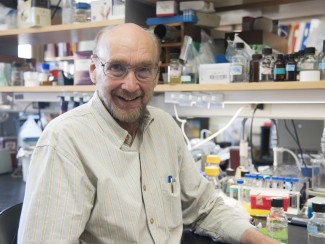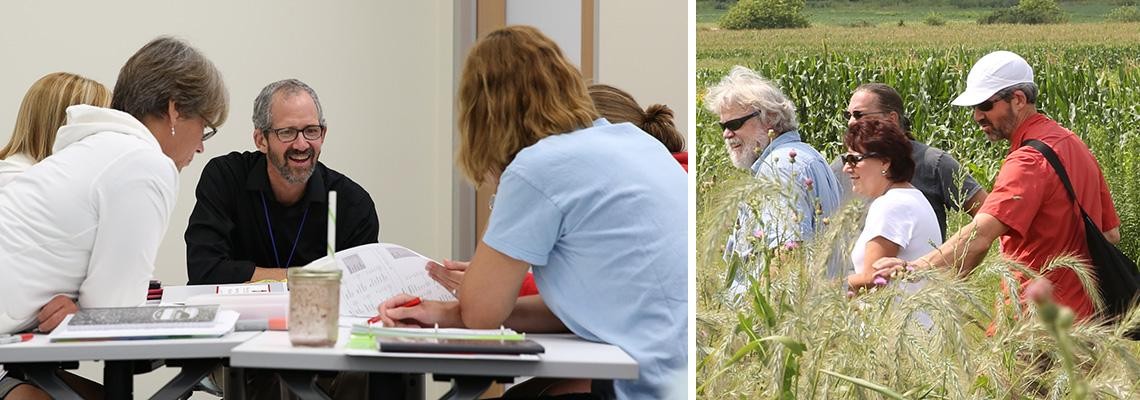
As a boy, wet and muddy to the knees, John Greenler did his share of up-ending rocks in streambeds to search for the crayfish and salamanders dwelling below.
“Looking back, I see that I was a biologist from the get-go,” Greenler says. “As a kid, I was always in the woods, mucking about and trying to understand what was going on in the streams and trees. Even then, I was in awe of photosynthesis, intrigued by the magic of how plants capture sunlight and turn it into energy.”
Greenler, the Education and Outreach Director at The Great Lakes Bioenergy Research Center (GLBRC) and Wisconsin Energy Institute (WEI), spends a little less time these days tromping through the forest, but feels lucky to have a job that combines his life-long love of plant biology with his passion for science education.
“Children have an innate sense of wonder and desire to explore the natural world,” Greenler says, “but our educational system can squash it out of them at a pretty young age.”
Greenler’s team is committed to helping science educators foster students’ sense of wonder, scientific interest, and engagement through middle school, high school, and college. This means pursuing two goals: 1) promoting inquiry-based science education in a way that encourages student involvement in the scientific process; and 2) helping teachers convey to students the interconnectedness of different areas of science, especially with respect to issues such as climate change and energy sustainability.
Promoting science education that allows kids to be actively involved in experiments is especially important to Greenler, who himself learned best from hands-on experiences.
“I wasn’t really able to understand the value of book-learning,” Greenler says, “until I could understand what I read in science books within the context of my own experience and experimentation.”
For Greenler, that “aha” moment came thanks to an enthusiastic biology teacher named George Hebard who taught at his suburban Philadelphia high school. Hebard brought the subject of biology alive for Greenler, and also brought Greenler along to Connecticut during summer breaks to assist him with wetland ecology research.
“I spent those summers with Hebard up to my chin in marshes where most people would dread to go,” Greenler says. “Honestly, I thought it was the greatest place to be!”
Inspired by his wetland research, Greenler attended Connecticut College, earning a degree in plant biology in 1981. A few years later, when thinking about going to graduate school, he paid a visit to UW–Madison.
“I was so impressed by the world-class biology at UW,” he says. “There were maybe 30 different departments involved in some aspect of biology. But what really stood out for me was that UW faculty and students thought in terms of synthesis and collaboration across departments and colleges. Ecologists, molecular biologists, chemists, and more – all working as a cohesive group.”
In 1983, Greenler moved to Madison to begin his Ph.D. studies in botany. His doctoral adviser Wayne Becker, a world-class researcher in plant cell and molecular biology, was a valuable academic mentor to Greenler but also a science education leader on campus.
Under Becker’s tutelage, Greenler became a teaching assistant in a progressive program for biology majors that had a strong inquiry focus. He also helped write the grant that initiated funding for The Institute for Biology Education (now known as WISCIENCE).
“Establishing the Institute brought together students and faculty committed to promoting inquiry-based learning across biology programs on campus and beyond,” Greenler says. “I was deep into my doctoral research, but there was a sea change in education theory at that time and I became really interested in how it related to science.”
In 1990, with Ph.D. in hand, Greenler had two options: a tantalizing offer to work as a post-doctoral researcher at the University of Oxford in the United Kingdom, or an unconventional research position at UW–Madison to work on bridging the worlds of scientific research and science education. In a decision that really marked the beginning of his long-term commitment to science education, Greenler chose the latter.
In 2000, after years of researching science education, Greenler signed on as a member of the biology faculty at Beloit College.
[The GLBRC] felt like a once in a lifetime opportunity to join an organization doing great interdisciplinary scientific work and develop an education program from the ground up.
John Greenler
At Beloit, Greenler had the chance to put his new strategies for inquiry-based education into practice. He developed a course on climate change, emphasizing its impacts on biological systems as well as the opportunity to use biological systems to mitigate climate change, including making second-generation biofuels from cellulosic biomass.
“I had always emphasized the interconnection between biological systems and energy in my course content,” Greenler says. “But my interest in energy definitely deepened over the years. And then I saw a job posting for someone to develop an energy education program at GLBRC.”
There were fewer than a dozen people working at the one-year-old GLBRC at the time and, while the leadership recognized that they wanted to develop some type of in-house education program, there was no formal – or even informal – agenda.
“It was wide open,” remembers Greenler. “It felt like a once in a lifetime opportunity to join an organization doing great interdisciplinary scientific work and develop an education program from the ground up.”
Since Greenler accepted the job in 2008, the GLBRC has grown to more than 400 scientists, students, and staff, and Greenler and his team have built a vibrant education & outreach program that connects hundreds of science educators and students with GLBRC scientists whose research explores today’s energy-related challenges.
“Our work is so exciting because we’re able to use examples of scientific research happening right here under our roof as case studies for students in classrooms,” says Greenler. “The research is topically important and relevant. Consequently, it keeps the kids – and me – very interested!”
Greenler’s education and outreach work is funded in part by The Great Lakes Bioenergy Research Center (GLBRC), one of three Department of Energy Bioenergy Research Centers created to make transformational breakthroughs that will form the foundation of new cellulosic biofuels technology. For more information on the GLBRC, visit www.glbrc.org.

